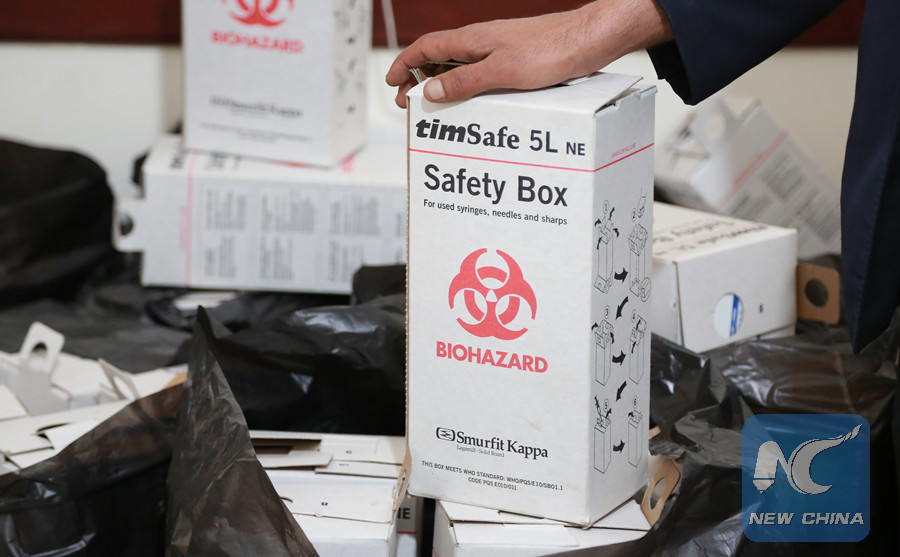
Yemenis are preparing medical supplies for possible new cholera outbreak in coming rainy season. (Xinhua/Azaki)
SANAA, March 23 (Xinhua) -- Though the number of cholera infection cases has declined rapidly in the rebel-held Yemeni capital Sanaa, fears grow about a possible new cholera outbreak in the upcoming rainy season.
With piles of rubbish bags mingled with stinking green watery filth being a common sight in the streets of Sanaa, the authorities here are struggling to prepare for another outbreak of the deadly disease.
Each day unpaid doctors arrive at a hospital in the west of Sanaa in order to save lives.
"Last night, we received three suspected cholera cases," said 25-year-old doctor Lamiees al-Huraybi.
"There were fears from a new wave of cholera outbreak within weeks in this rainy season," she told Xinhua.
Adnan Hizam, spokesman of the International Committee of the Red Cross (ICRC), told Xinhua that there are growing fears that the epidemic which infected 1 million people in Yemen last year could erupt again within weeks.
The rainy season will last from the end of April to August.
"The ongoing war and collapse of the health system are increasing the expectation for a new surge of cholera infections," Hizam said.
Hizam said the decline in the number of cholera cases did not mean that the epidemic was about to be over, which can happen only if the war ends, the blockade is lifted and the health system is rebuilt.
In November 2017, the United Nations reported more than 925,000 suspected cholera cases with over 2,200 associated deaths in the war-torn country since the epidemic started in April of the same year.
The infection rate has since been declining, by around 0.2 to 0.3 percent, according to the World Health Organization (WHO).
Labib al-Aqlani, deputy manager of 22 May hospital, told Xinhua the hospital had received over 300,000 infected cases during last year's rainy months.
"So we got an experience from last year, and this year we are preparing in cooperation with the ICRC, the WHO and other aid agencies to try to do our best to control any potential surge," said al-Aqlani.
At the hospital, the doctors showed Xinhua reporters the special section of cholera treatment rooms, a medicine store and other preparations for any potential new outbreak.
"We mainly rely on aid from the international agencies, and these preparations are for dealing with possible new surge of cholera infections," al-Aqlani added.
Like thousands of other Yemeni government staff members, doctors in this state-run hospital have not been paid for one year and a half after the internationally-recognized government relocated the Central Bank from the Houthi rebels-held capital Sanaa to the southern port city of Aden in September 2016.
The UN said more than 80 percent of cholera cases were in the areas close to the Red Sea ports of Hodeidah and Saleef.
The entire population of 25 million people of Yemen are dependent on food, fuel and medicine imports, primarily through sea ports. More than 17 million Yemenis, or two-thirds of the population, are living in food insecurity, according to the UN.
The war-torn country has also suffered from diphtheria which has infected over 1,300 people and killed 70, mostly children, since it was first reported in October 2017.
Last week, the WHO, UN International Children's Emergency Fund (UNICEF) and national health authorities have completed a large-scale diphtheria vaccination campaign in Yemen.
The campaign targeted nearly 2.7 million children aged between six weeks to 15 years old in 11 governorates. It focused on locations reporting suspected cases of diphtheria and areas at high risk of spread of the infectious respiratory disease.
Yemen has been locked in a civil war for three years after the Iranian-backed Shiite Houthi rebels overran much of the country militarily and seized all northern provinces including Sanaa in late 2014.
Saudi Arabia has been leading an Arab military coalition since March 2015 to support the government of President Abd-Rabbu Mansour Hadi after the Houthis forced him into exile.
The war has killed more than 10,000 Yemenis, half of them civilians, and displaced over 3 million others, according to UN humanitarian agencies.
The ongoing war has hit a stalemate, creating the largest humanitarian crisis in the world and pushing the country into the brink of famine, with an estimated 385,000 children suffering from acute malnutrition, thus putting them at heightened risk of acute watery diarrhea and cholera, according to the UN agencies.
"In case of any possible surge of the cholera epidemic, our preparations, the small treatment rooms and this medicine store is not enough," al-Aqlani said.

